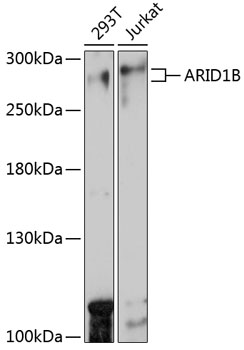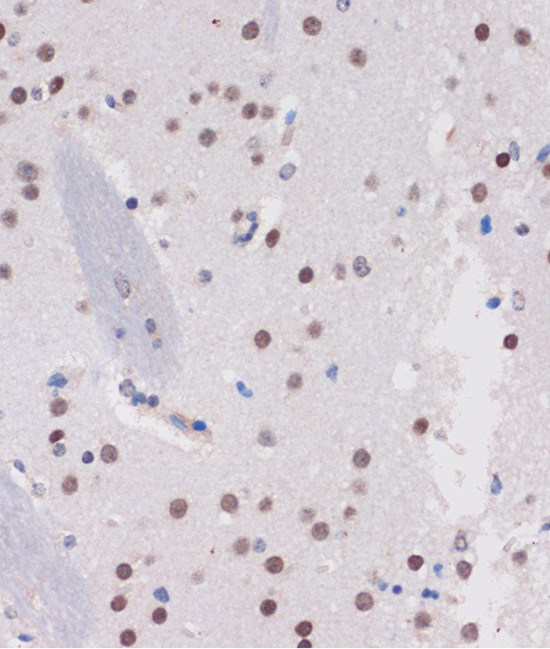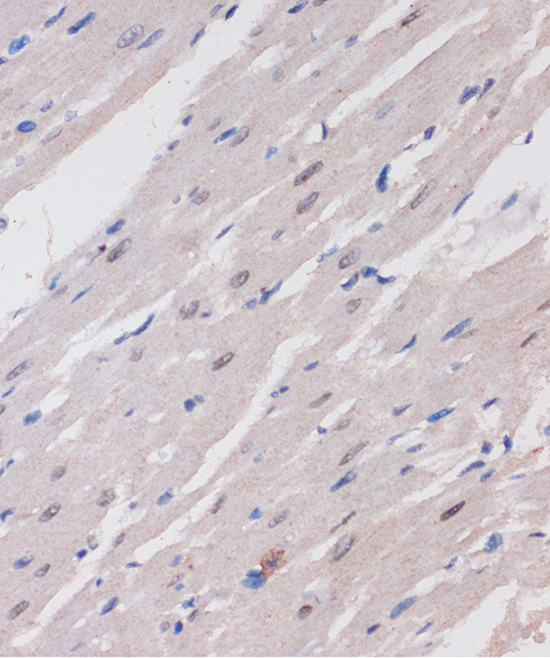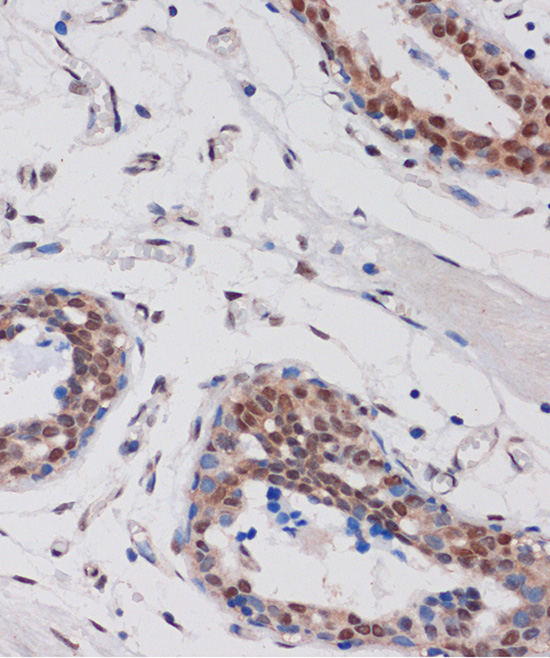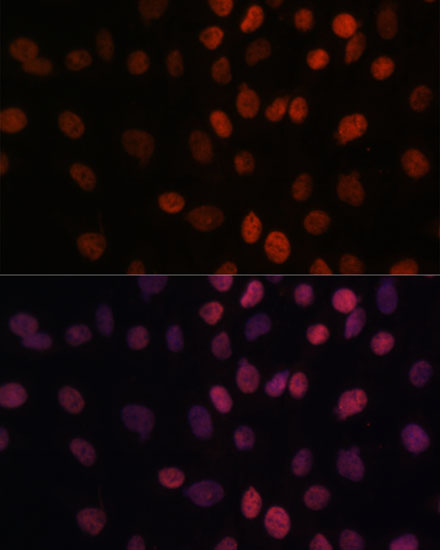Neuroscience
Anti-ARID1B Antibody (CAB15488)
- SKU:
- CAB15488
- Product Type:
- Antibody
- Reactivity:
- Human
- Reactivity:
- Mouse
- Reactivity:
- Rat
- Host Species:
- Rabbit
- Isotype:
- IgG
- Antibody Type:
- Polyclonal Antibody
- Research Area:
- Neuroscience
Description
| Antibody Name: | Anti-ARID1B Antibody |
| Antibody SKU: | CAB15488 |
| Antibody Size: | 20uL, 50uL, 100uL |
| Application: | WB IHC IF |
| Reactivity: | Human, Mouse, Rat |
| Host Species: | Rabbit |
| Immunogen: | Recombinant fusion protein containing a sequence corresponding to amino acids 400-650 of human ARID1B (NP_059989.2). |
| Application: | WB IHC IF |
| Recommended Dilution: | WB 1:200 - 1:2000 IHC 1:50 - 1:200 IF 1:50 - 1:200 |
| Reactivity: | Human, Mouse, Rat |
| Positive Samples: |
| Immunogen: | Recombinant fusion protein containing a sequence corresponding to amino acids 400-650 of human ARID1B (NP_059989.2). |
| Purification Method: | Affinity purification |
| Storage Buffer: | Store at -20'C. Avoid freeze / thaw cycles. Buffer: PBS with 0.02% sodium azide, 50% glycerol, pH7.3. |
| Isotype: | IgG |
| Sequence: | GGFQ RFAG QNQH PSGA TPTL NQLL TSPS PMMR SYGG SYPE YSSP SAPP PPPS QPQS QAAA AGAA AGGQ QAAA GMGL GKDM GAQY AAAS PAWA AAQQ RSHP AMSP GTPG PTMG RSQG SPMD PMVM KRPQ LYGM GSNP HSQP QQSS PYPG GSYG PPGP QRYP IGIQ GRTP GAMA GMQY PQQQ MPPQ YGQQ GVSG YCQQ GQQP YYSQ QPQP PHLP PQAQ YLPS QSQQ RYQP QQDM SQEG YGTR SQPP LAPG KPN |
| Gene ID: | 57492 |
| Uniprot: | Q8NFD5 |
| Cellular Location: | Nucleus |
| Calculated MW: | 162kDa/236kDa/237kDa/241kDa |
| Observed MW: | Refer to figures |
| Synonyms: | ARID1B, 6A3-5, BAF250B, BRIGHT, CSS1, DAN15, ELD/OSA1, MRD12, OSA2, P250R |
| Background: | This locus encodes an AT-rich DNA interacting domain-containing protein. The encoded protein is a component of the SWI/SNF chromatin remodeling complex and may play a role in cell-cycle activation. The protein encoded by this locus is similar to AT-rich interactive domain-containing protein 1A. These two proteins function as alternative, mutually exclusive ARID-subunits of the SWI/SNF complex. The associated complexes play opposing roles. Alternative splicing results in multiple transcript variants. |
| UniProt Protein Function: | ARID1B: Involved in transcriptional activation and repression of select genes by chromatin remodeling (alteration of DNA-nucleosome topology). Belongs to the neural progenitors-specific chromatin remodeling complex (npBAF complex) and the neuron-specific chromatin remodeling complex (nBAF complex). During neural development a switch from a stem/progenitor to a post-mitotic chromatin remodeling mechanism occurs as neurons exit the cell cycle and become committed to their adult state. The transition from proliferating neural stem/progenitor cells to post-mitotic neurons requires a switch in subunit composition of the npBAF and nBAF complexes. As neural progenitors exit mitosis and differentiate into neurons, npBAF complexes which contain ACTL6A/BAF53A and PHF10/BAF45A, are exchanged for homologous alternative ACTL6B/BAF53B and DPF1/BAF45B or DPF3/BAF45C subunits in neuron-specific complexes (nBAF). The npBAF complex is essential for the self-renewal/proliferative capacity of the multipotent neural stem cells. The nBAF complex along with CREST plays a role regulating the activity of genes essential for dendrite growth. Binds DNA non-specifically. Defects in ARID1B are the cause of mental retardation autosomal dominant type 12 (MRD12). A disorder characterized by significantly below average general intellectual functioning associated with impairments in adaptative behavior and manifested during the developmental period. MRD12 patients present with moderate to severe psychomotor retardation, and most show evidence of muscular hypotonia. In many patients, expressive speech is more severely affected than receptive function. Additional common findings include short stature, abnormal head shape and low-set, posteriorly rotated, and abnormally shaped ears, downslanting palpebral fissures, a bulbous nasal tip, a thin upper lip, minor teeth anomalies, and brachydactyly or single palmar creases. Autistic features are uncommon. 4 isoforms of the human protein are produced by alternative splicing. |
| UniProt Protein Details: | Protein type:Nuclear receptor co-regulator; DNA-binding Chromosomal Location of Human Ortholog: 6q25.1 Cellular Component: nucleoplasm; SWI/SNF complex; cytoplasm Molecular Function:protein binding; DNA binding; transcription coactivator activity Biological Process: nervous system development; transcription, DNA-dependent; chromatin-mediated maintenance of transcription Disease: Mental Retardation, Autosomal Dominant 12 |
| NCBI Summary: | This locus encodes an AT-rich DNA interacting domain-containing protein. The encoded protein is a component of the SWI/SNF chromatin remodeling complex and may play a role in cell-cycle activation. The protein encoded by this locus is similar to AT-rich interactive domain-containing protein 1A. These two proteins function as alternative, mutually exclusive ARID-subunits of the SWI/SNF complex. The associated complexes play opposing roles. Alternatively spliced transcript variants encoding different isoforms have been described. [provided by RefSeq, Feb 2012] |
| UniProt Code: | Q8NFD5 |
| NCBI GenInfo Identifier: | 73921720 |
| NCBI Gene ID: | 57492 |
| NCBI Accession: | Q8NFD5.2 |
| UniProt Secondary Accession: | Q8NFD5,Q5JRD1, Q5VYC4, Q8IZY8, Q8TEV0, Q8TF02, Q99491 Q9ULI5, |
| UniProt Related Accession: | Q8NFD5 |
| Molecular Weight: | 162,470 Da |
| NCBI Full Name: | AT-rich interactive domain-containing protein 1B |
| NCBI Synonym Full Names: | AT rich interactive domain 1B (SWI1-like) |
| NCBI Official Symbol: | ARID1B |
| NCBI Official Synonym Symbols: | OSA2; 6A3-5; DAN15; MRD12; P250R; BRIGHT; BAF250B; ELD/OSA1 |
| NCBI Protein Information: | AT-rich interactive domain-containing protein 1B; ELD (eyelid)/OSA protein; BRG1-associated factor 250b; BRG1-binding protein ELD/OSA1; ARID domain-containing protein 1B |
| UniProt Protein Name: | AT-rich interactive domain-containing protein 1B |
| UniProt Synonym Protein Names: | BRG1-associated factor 250b; BAF250B; BRG1-binding protein hELD/OSA1; Osa homolog 2; hOsa2; p250R |
| Protein Family: | AT-rich interactive domain-containing protein |
| UniProt Gene Name: | ARID1B |
| UniProt Entry Name: | ARI1B_HUMAN |
View AllClose


